MBA 600 Reflective Essay: Course Learning, Skills, and Future Career
VerifiedAdded on 2022/08/14
|11
|3296
|43
Essay
AI Summary
This reflective essay examines the learning journey undertaken in the MBA 600 Capstone course. It begins with an introduction outlining the essay's structure, followed by a summary of reflective capability and the four essential capstone skills learned in the first week, including critical assessment of theories, applying knowledge, solving business problems, and strategic implementation. The essay provides personal reflections on the capstone subject and consultancy research process, highlighting the importance of core subjects like MBA401, MBA402, MBA403, and MBA404, financial analysis, consumer behavior, and disruptive innovation. The student reflects on the skills developed throughout the MBA program, emphasizing key concepts such as competitive advantage, leadership styles, corporate social responsibility, and strategic planning. Finally, the essay concludes with a reflection on how the acquired knowledge and skills will contribute to future career endeavors, emphasizing the application of competitive advantage, leadership, and other business concepts in a professional context.
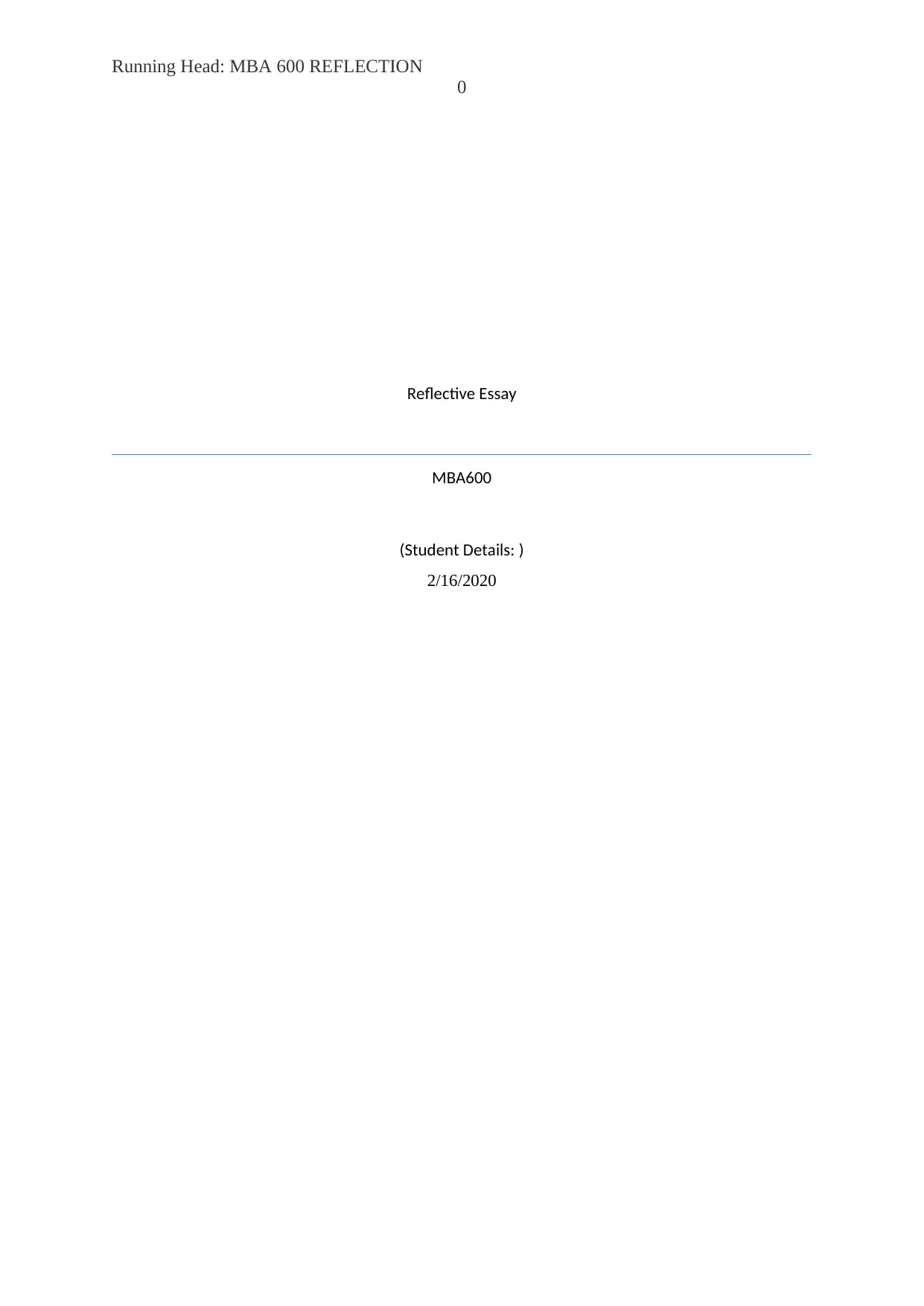
Running Head: MBA 600 REFLECTION
0
Reflective Essay
MBA600
(Student Details: )
2/16/2020
0
Reflective Essay
MBA600
(Student Details: )
2/16/2020
Paraphrase This Document
Need a fresh take? Get an instant paraphrase of this document with our AI Paraphraser
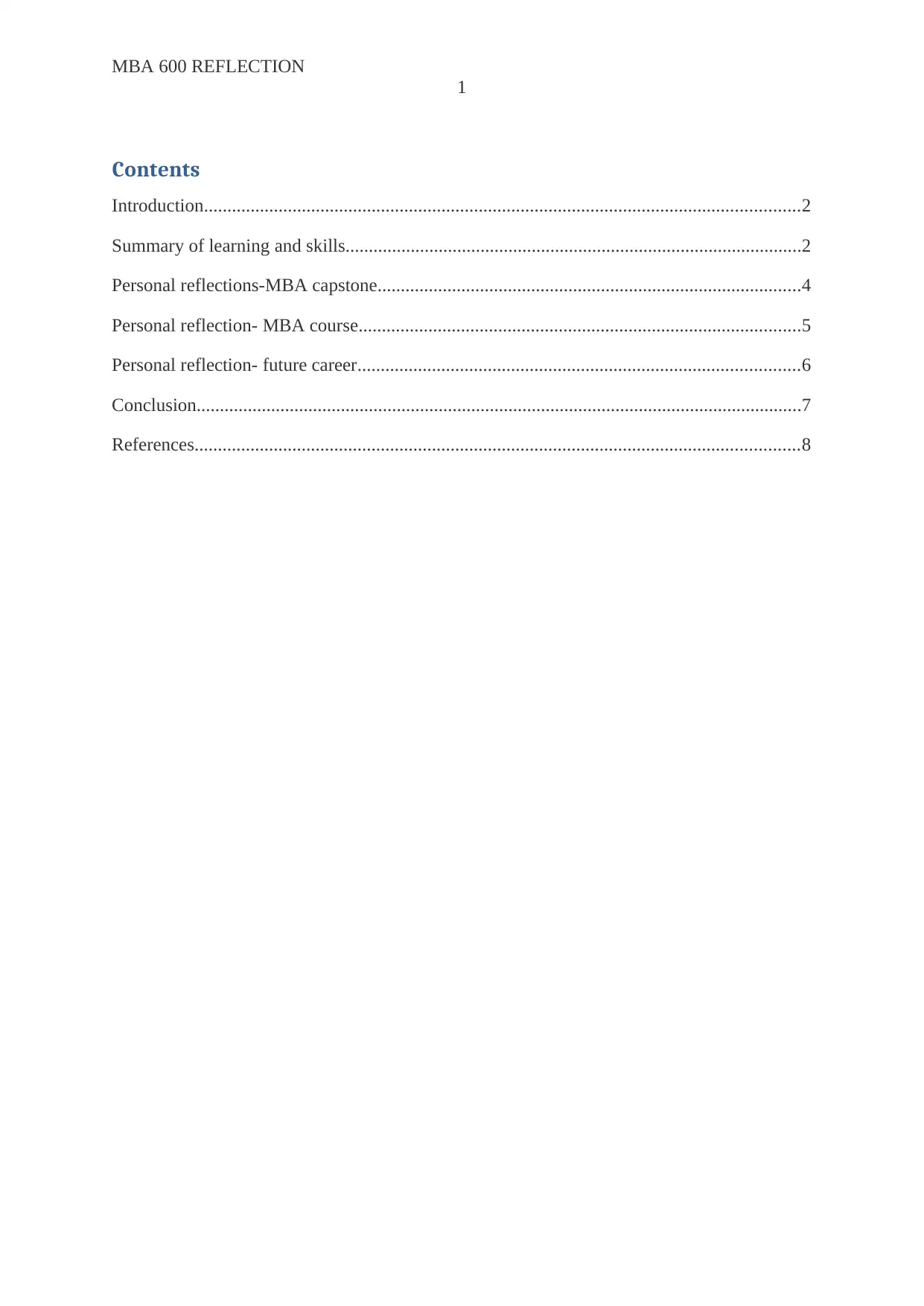
MBA 600 REFLECTION
1
Contents
Introduction................................................................................................................................2
Summary of learning and skills..................................................................................................2
Personal reflections-MBA capstone...........................................................................................4
Personal reflection- MBA course...............................................................................................5
Personal reflection- future career...............................................................................................6
Conclusion..................................................................................................................................7
References..................................................................................................................................8
1
Contents
Introduction................................................................................................................................2
Summary of learning and skills..................................................................................................2
Personal reflections-MBA capstone...........................................................................................4
Personal reflection- MBA course...............................................................................................5
Personal reflection- future career...............................................................................................6
Conclusion..................................................................................................................................7
References..................................................................................................................................8
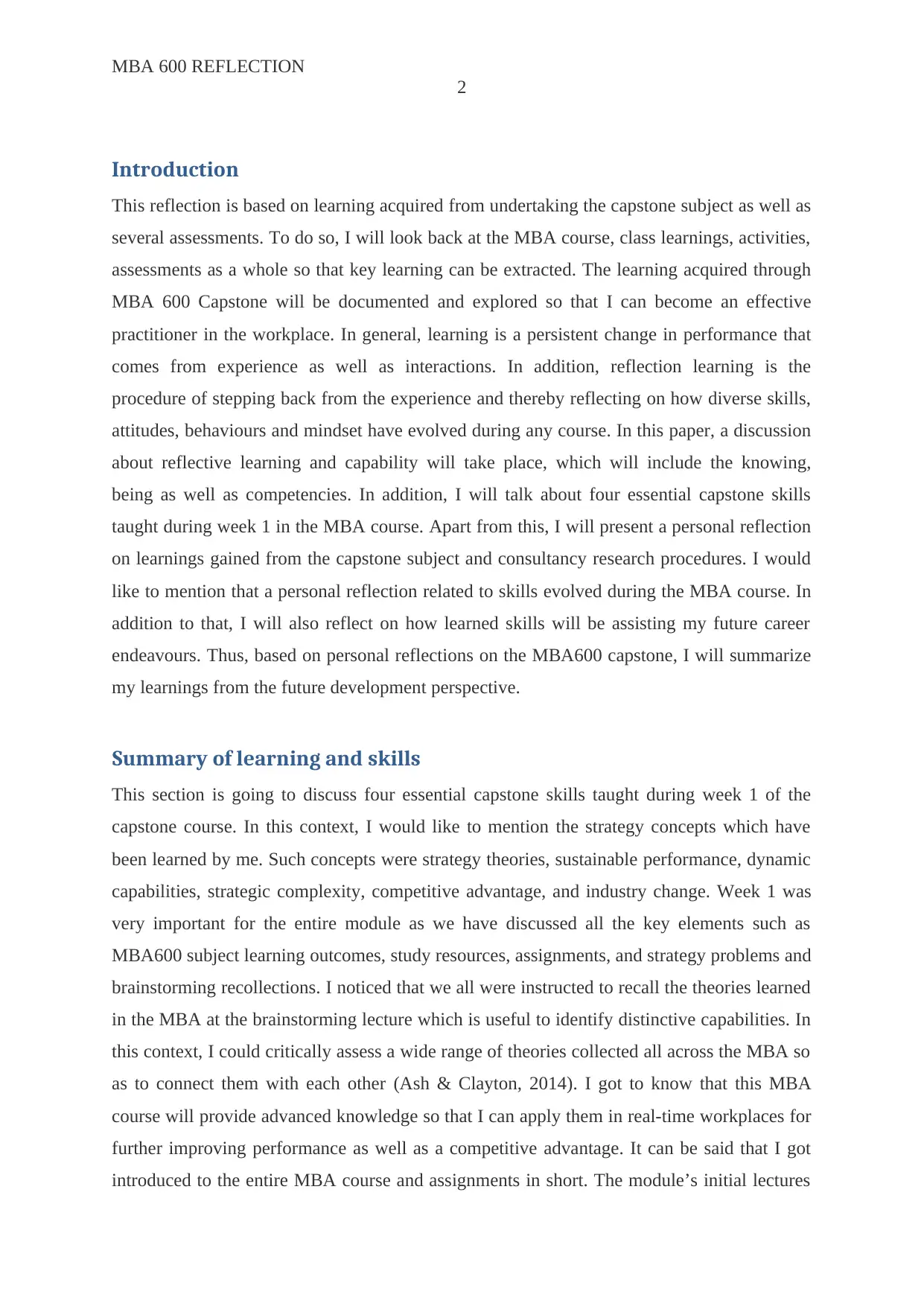
MBA 600 REFLECTION
2
Introduction
This reflection is based on learning acquired from undertaking the capstone subject as well as
several assessments. To do so, I will look back at the MBA course, class learnings, activities,
assessments as a whole so that key learning can be extracted. The learning acquired through
MBA 600 Capstone will be documented and explored so that I can become an effective
practitioner in the workplace. In general, learning is a persistent change in performance that
comes from experience as well as interactions. In addition, reflection learning is the
procedure of stepping back from the experience and thereby reflecting on how diverse skills,
attitudes, behaviours and mindset have evolved during any course. In this paper, a discussion
about reflective learning and capability will take place, which will include the knowing,
being as well as competencies. In addition, I will talk about four essential capstone skills
taught during week 1 in the MBA course. Apart from this, I will present a personal reflection
on learnings gained from the capstone subject and consultancy research procedures. I would
like to mention that a personal reflection related to skills evolved during the MBA course. In
addition to that, I will also reflect on how learned skills will be assisting my future career
endeavours. Thus, based on personal reflections on the MBA600 capstone, I will summarize
my learnings from the future development perspective.
Summary of learning and skills
This section is going to discuss four essential capstone skills taught during week 1 of the
capstone course. In this context, I would like to mention the strategy concepts which have
been learned by me. Such concepts were strategy theories, sustainable performance, dynamic
capabilities, strategic complexity, competitive advantage, and industry change. Week 1 was
very important for the entire module as we have discussed all the key elements such as
MBA600 subject learning outcomes, study resources, assignments, and strategy problems and
brainstorming recollections. I noticed that we all were instructed to recall the theories learned
in the MBA at the brainstorming lecture which is useful to identify distinctive capabilities. In
this context, I could critically assess a wide range of theories collected all across the MBA so
as to connect them with each other (Ash & Clayton, 2014). I got to know that this MBA
course will provide advanced knowledge so that I can apply them in real-time workplaces for
further improving performance as well as a competitive advantage. It can be said that I got
introduced to the entire MBA course and assignments in short. The module’s initial lectures
2
Introduction
This reflection is based on learning acquired from undertaking the capstone subject as well as
several assessments. To do so, I will look back at the MBA course, class learnings, activities,
assessments as a whole so that key learning can be extracted. The learning acquired through
MBA 600 Capstone will be documented and explored so that I can become an effective
practitioner in the workplace. In general, learning is a persistent change in performance that
comes from experience as well as interactions. In addition, reflection learning is the
procedure of stepping back from the experience and thereby reflecting on how diverse skills,
attitudes, behaviours and mindset have evolved during any course. In this paper, a discussion
about reflective learning and capability will take place, which will include the knowing,
being as well as competencies. In addition, I will talk about four essential capstone skills
taught during week 1 in the MBA course. Apart from this, I will present a personal reflection
on learnings gained from the capstone subject and consultancy research procedures. I would
like to mention that a personal reflection related to skills evolved during the MBA course. In
addition to that, I will also reflect on how learned skills will be assisting my future career
endeavours. Thus, based on personal reflections on the MBA600 capstone, I will summarize
my learnings from the future development perspective.
Summary of learning and skills
This section is going to discuss four essential capstone skills taught during week 1 of the
capstone course. In this context, I would like to mention the strategy concepts which have
been learned by me. Such concepts were strategy theories, sustainable performance, dynamic
capabilities, strategic complexity, competitive advantage, and industry change. Week 1 was
very important for the entire module as we have discussed all the key elements such as
MBA600 subject learning outcomes, study resources, assignments, and strategy problems and
brainstorming recollections. I noticed that we all were instructed to recall the theories learned
in the MBA at the brainstorming lecture which is useful to identify distinctive capabilities. In
this context, I could critically assess a wide range of theories collected all across the MBA so
as to connect them with each other (Ash & Clayton, 2014). I got to know that this MBA
course will provide advanced knowledge so that I can apply them in real-time workplaces for
further improving performance as well as a competitive advantage. It can be said that I got
introduced to the entire MBA course and assignments in short. The module’s initial lectures
⊘ This is a preview!⊘
Do you want full access?
Subscribe today to unlock all pages.

Trusted by 1+ million students worldwide
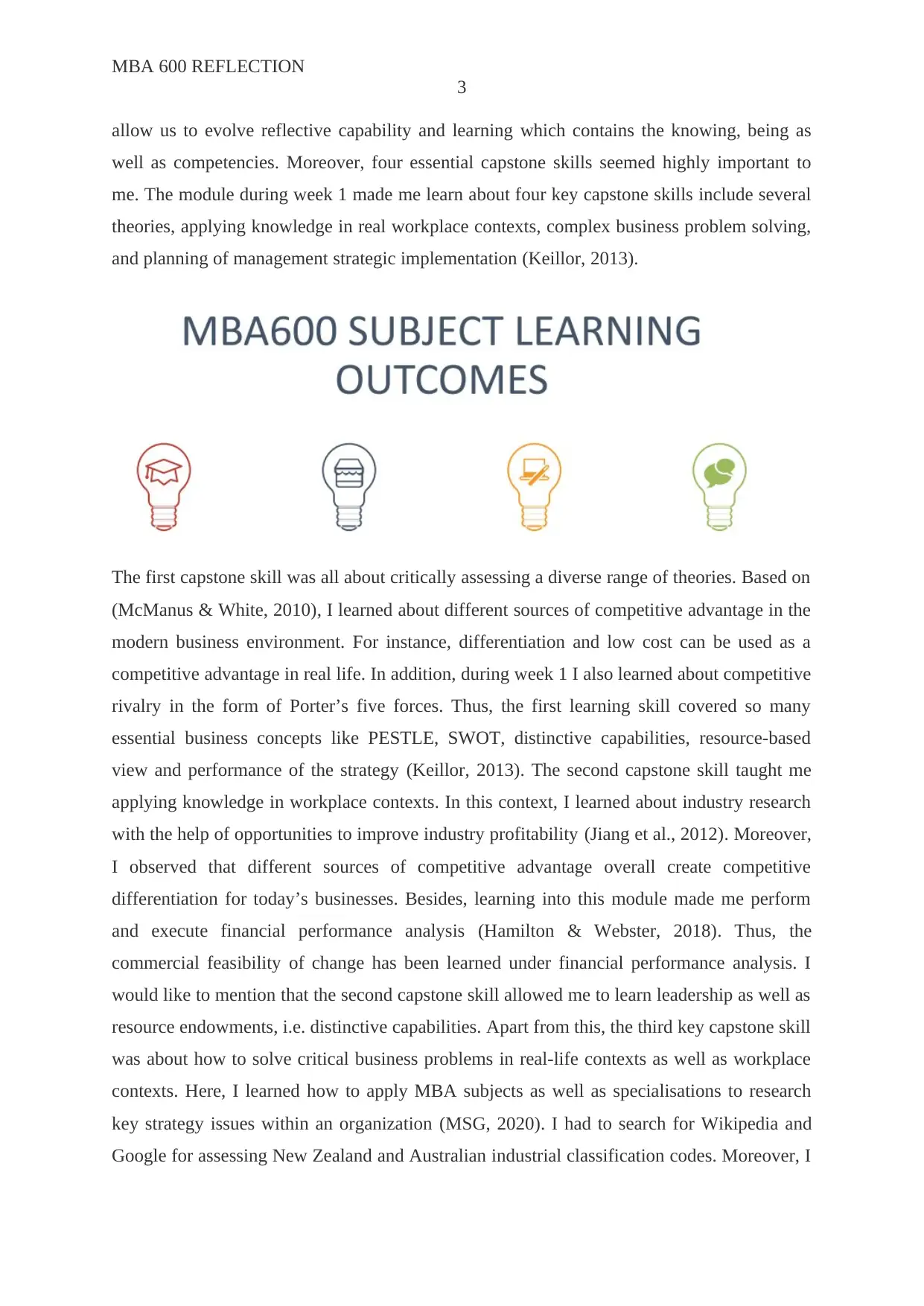
MBA 600 REFLECTION
3
allow us to evolve reflective capability and learning which contains the knowing, being as
well as competencies. Moreover, four essential capstone skills seemed highly important to
me. The module during week 1 made me learn about four key capstone skills include several
theories, applying knowledge in real workplace contexts, complex business problem solving,
and planning of management strategic implementation (Keillor, 2013).
The first capstone skill was all about critically assessing a diverse range of theories. Based on
(McManus & White, 2010), I learned about different sources of competitive advantage in the
modern business environment. For instance, differentiation and low cost can be used as a
competitive advantage in real life. In addition, during week 1 I also learned about competitive
rivalry in the form of Porter’s five forces. Thus, the first learning skill covered so many
essential business concepts like PESTLE, SWOT, distinctive capabilities, resource-based
view and performance of the strategy (Keillor, 2013). The second capstone skill taught me
applying knowledge in workplace contexts. In this context, I learned about industry research
with the help of opportunities to improve industry profitability (Jiang et al., 2012). Moreover,
I observed that different sources of competitive advantage overall create competitive
differentiation for today’s businesses. Besides, learning into this module made me perform
and execute financial performance analysis (Hamilton & Webster, 2018). Thus, the
commercial feasibility of change has been learned under financial performance analysis. I
would like to mention that the second capstone skill allowed me to learn leadership as well as
resource endowments, i.e. distinctive capabilities. Apart from this, the third key capstone skill
was about how to solve critical business problems in real-life contexts as well as workplace
contexts. Here, I learned how to apply MBA subjects as well as specialisations to research
key strategy issues within an organization (MSG, 2020). I had to search for Wikipedia and
Google for assessing New Zealand and Australian industrial classification codes. Moreover, I
3
allow us to evolve reflective capability and learning which contains the knowing, being as
well as competencies. Moreover, four essential capstone skills seemed highly important to
me. The module during week 1 made me learn about four key capstone skills include several
theories, applying knowledge in real workplace contexts, complex business problem solving,
and planning of management strategic implementation (Keillor, 2013).
The first capstone skill was all about critically assessing a diverse range of theories. Based on
(McManus & White, 2010), I learned about different sources of competitive advantage in the
modern business environment. For instance, differentiation and low cost can be used as a
competitive advantage in real life. In addition, during week 1 I also learned about competitive
rivalry in the form of Porter’s five forces. Thus, the first learning skill covered so many
essential business concepts like PESTLE, SWOT, distinctive capabilities, resource-based
view and performance of the strategy (Keillor, 2013). The second capstone skill taught me
applying knowledge in workplace contexts. In this context, I learned about industry research
with the help of opportunities to improve industry profitability (Jiang et al., 2012). Moreover,
I observed that different sources of competitive advantage overall create competitive
differentiation for today’s businesses. Besides, learning into this module made me perform
and execute financial performance analysis (Hamilton & Webster, 2018). Thus, the
commercial feasibility of change has been learned under financial performance analysis. I
would like to mention that the second capstone skill allowed me to learn leadership as well as
resource endowments, i.e. distinctive capabilities. Apart from this, the third key capstone skill
was about how to solve critical business problems in real-life contexts as well as workplace
contexts. Here, I learned how to apply MBA subjects as well as specialisations to research
key strategy issues within an organization (MSG, 2020). I had to search for Wikipedia and
Google for assessing New Zealand and Australian industrial classification codes. Moreover, I
Paraphrase This Document
Need a fresh take? Get an instant paraphrase of this document with our AI Paraphraser
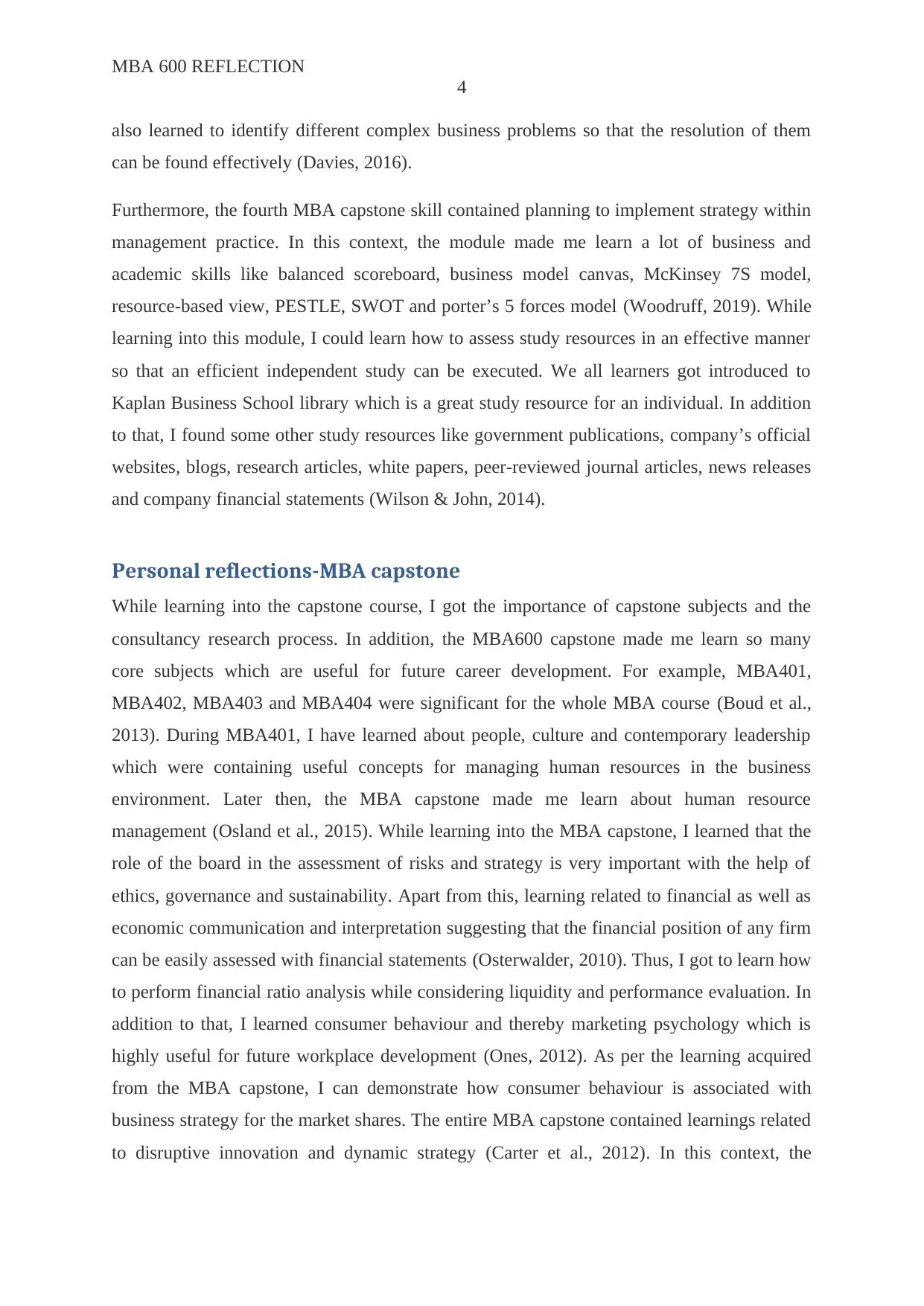
MBA 600 REFLECTION
4
also learned to identify different complex business problems so that the resolution of them
can be found effectively (Davies, 2016).
Furthermore, the fourth MBA capstone skill contained planning to implement strategy within
management practice. In this context, the module made me learn a lot of business and
academic skills like balanced scoreboard, business model canvas, McKinsey 7S model,
resource-based view, PESTLE, SWOT and porter’s 5 forces model (Woodruff, 2019). While
learning into this module, I could learn how to assess study resources in an effective manner
so that an efficient independent study can be executed. We all learners got introduced to
Kaplan Business School library which is a great study resource for an individual. In addition
to that, I found some other study resources like government publications, company’s official
websites, blogs, research articles, white papers, peer-reviewed journal articles, news releases
and company financial statements (Wilson & John, 2014).
Personal reflections-MBA capstone
While learning into the capstone course, I got the importance of capstone subjects and the
consultancy research process. In addition, the MBA600 capstone made me learn so many
core subjects which are useful for future career development. For example, MBA401,
MBA402, MBA403 and MBA404 were significant for the whole MBA course (Boud et al.,
2013). During MBA401, I have learned about people, culture and contemporary leadership
which were containing useful concepts for managing human resources in the business
environment. Later then, the MBA capstone made me learn about human resource
management (Osland et al., 2015). While learning into the MBA capstone, I learned that the
role of the board in the assessment of risks and strategy is very important with the help of
ethics, governance and sustainability. Apart from this, learning related to financial as well as
economic communication and interpretation suggesting that the financial position of any firm
can be easily assessed with financial statements (Osterwalder, 2010). Thus, I got to learn how
to perform financial ratio analysis while considering liquidity and performance evaluation. In
addition to that, I learned consumer behaviour and thereby marketing psychology which is
highly useful for future workplace development (Ones, 2012). As per the learning acquired
from the MBA capstone, I can demonstrate how consumer behaviour is associated with
business strategy for the market shares. The entire MBA capstone contained learnings related
to disruptive innovation and dynamic strategy (Carter et al., 2012). In this context, the
4
also learned to identify different complex business problems so that the resolution of them
can be found effectively (Davies, 2016).
Furthermore, the fourth MBA capstone skill contained planning to implement strategy within
management practice. In this context, the module made me learn a lot of business and
academic skills like balanced scoreboard, business model canvas, McKinsey 7S model,
resource-based view, PESTLE, SWOT and porter’s 5 forces model (Woodruff, 2019). While
learning into this module, I could learn how to assess study resources in an effective manner
so that an efficient independent study can be executed. We all learners got introduced to
Kaplan Business School library which is a great study resource for an individual. In addition
to that, I found some other study resources like government publications, company’s official
websites, blogs, research articles, white papers, peer-reviewed journal articles, news releases
and company financial statements (Wilson & John, 2014).
Personal reflections-MBA capstone
While learning into the capstone course, I got the importance of capstone subjects and the
consultancy research process. In addition, the MBA600 capstone made me learn so many
core subjects which are useful for future career development. For example, MBA401,
MBA402, MBA403 and MBA404 were significant for the whole MBA course (Boud et al.,
2013). During MBA401, I have learned about people, culture and contemporary leadership
which were containing useful concepts for managing human resources in the business
environment. Later then, the MBA capstone made me learn about human resource
management (Osland et al., 2015). While learning into the MBA capstone, I learned that the
role of the board in the assessment of risks and strategy is very important with the help of
ethics, governance and sustainability. Apart from this, learning related to financial as well as
economic communication and interpretation suggesting that the financial position of any firm
can be easily assessed with financial statements (Osterwalder, 2010). Thus, I got to learn how
to perform financial ratio analysis while considering liquidity and performance evaluation. In
addition to that, I learned consumer behaviour and thereby marketing psychology which is
highly useful for future workplace development (Ones, 2012). As per the learning acquired
from the MBA capstone, I can demonstrate how consumer behaviour is associated with
business strategy for the market shares. The entire MBA capstone contained learnings related
to disruptive innovation and dynamic strategy (Carter et al., 2012). In this context, the
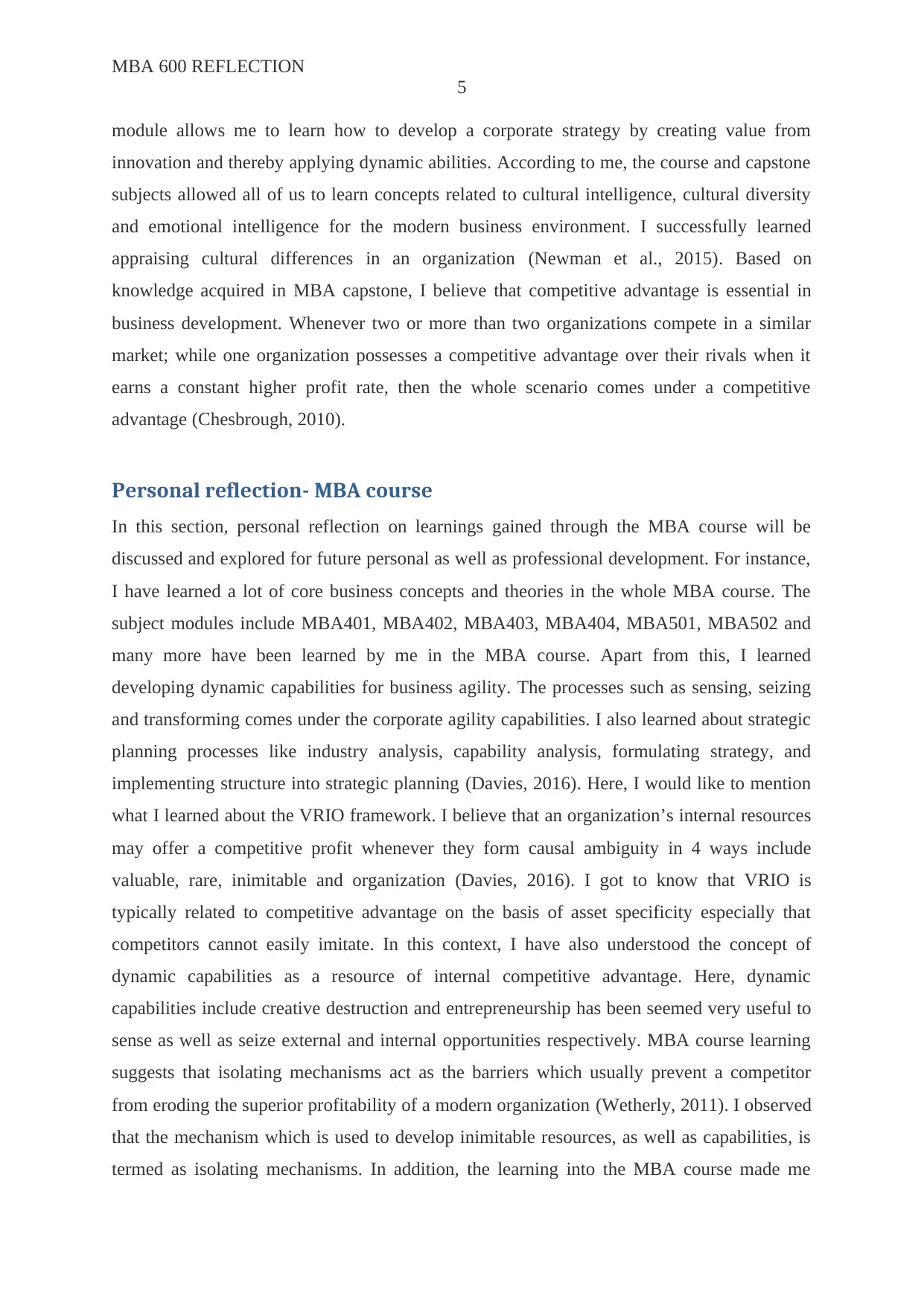
MBA 600 REFLECTION
5
module allows me to learn how to develop a corporate strategy by creating value from
innovation and thereby applying dynamic abilities. According to me, the course and capstone
subjects allowed all of us to learn concepts related to cultural intelligence, cultural diversity
and emotional intelligence for the modern business environment. I successfully learned
appraising cultural differences in an organization (Newman et al., 2015). Based on
knowledge acquired in MBA capstone, I believe that competitive advantage is essential in
business development. Whenever two or more than two organizations compete in a similar
market; while one organization possesses a competitive advantage over their rivals when it
earns a constant higher profit rate, then the whole scenario comes under a competitive
advantage (Chesbrough, 2010).
Personal reflection- MBA course
In this section, personal reflection on learnings gained through the MBA course will be
discussed and explored for future personal as well as professional development. For instance,
I have learned a lot of core business concepts and theories in the whole MBA course. The
subject modules include MBA401, MBA402, MBA403, MBA404, MBA501, MBA502 and
many more have been learned by me in the MBA course. Apart from this, I learned
developing dynamic capabilities for business agility. The processes such as sensing, seizing
and transforming comes under the corporate agility capabilities. I also learned about strategic
planning processes like industry analysis, capability analysis, formulating strategy, and
implementing structure into strategic planning (Davies, 2016). Here, I would like to mention
what I learned about the VRIO framework. I believe that an organization’s internal resources
may offer a competitive profit whenever they form causal ambiguity in 4 ways include
valuable, rare, inimitable and organization (Davies, 2016). I got to know that VRIO is
typically related to competitive advantage on the basis of asset specificity especially that
competitors cannot easily imitate. In this context, I have also understood the concept of
dynamic capabilities as a resource of internal competitive advantage. Here, dynamic
capabilities include creative destruction and entrepreneurship has been seemed very useful to
sense as well as seize external and internal opportunities respectively. MBA course learning
suggests that isolating mechanisms act as the barriers which usually prevent a competitor
from eroding the superior profitability of a modern organization (Wetherly, 2011). I observed
that the mechanism which is used to develop inimitable resources, as well as capabilities, is
termed as isolating mechanisms. In addition, the learning into the MBA course made me
5
module allows me to learn how to develop a corporate strategy by creating value from
innovation and thereby applying dynamic abilities. According to me, the course and capstone
subjects allowed all of us to learn concepts related to cultural intelligence, cultural diversity
and emotional intelligence for the modern business environment. I successfully learned
appraising cultural differences in an organization (Newman et al., 2015). Based on
knowledge acquired in MBA capstone, I believe that competitive advantage is essential in
business development. Whenever two or more than two organizations compete in a similar
market; while one organization possesses a competitive advantage over their rivals when it
earns a constant higher profit rate, then the whole scenario comes under a competitive
advantage (Chesbrough, 2010).
Personal reflection- MBA course
In this section, personal reflection on learnings gained through the MBA course will be
discussed and explored for future personal as well as professional development. For instance,
I have learned a lot of core business concepts and theories in the whole MBA course. The
subject modules include MBA401, MBA402, MBA403, MBA404, MBA501, MBA502 and
many more have been learned by me in the MBA course. Apart from this, I learned
developing dynamic capabilities for business agility. The processes such as sensing, seizing
and transforming comes under the corporate agility capabilities. I also learned about strategic
planning processes like industry analysis, capability analysis, formulating strategy, and
implementing structure into strategic planning (Davies, 2016). Here, I would like to mention
what I learned about the VRIO framework. I believe that an organization’s internal resources
may offer a competitive profit whenever they form causal ambiguity in 4 ways include
valuable, rare, inimitable and organization (Davies, 2016). I got to know that VRIO is
typically related to competitive advantage on the basis of asset specificity especially that
competitors cannot easily imitate. In this context, I have also understood the concept of
dynamic capabilities as a resource of internal competitive advantage. Here, dynamic
capabilities include creative destruction and entrepreneurship has been seemed very useful to
sense as well as seize external and internal opportunities respectively. MBA course learning
suggests that isolating mechanisms act as the barriers which usually prevent a competitor
from eroding the superior profitability of a modern organization (Wetherly, 2011). I observed
that the mechanism which is used to develop inimitable resources, as well as capabilities, is
termed as isolating mechanisms. In addition, the learning into the MBA course made me
⊘ This is a preview!⊘
Do you want full access?
Subscribe today to unlock all pages.

Trusted by 1+ million students worldwide
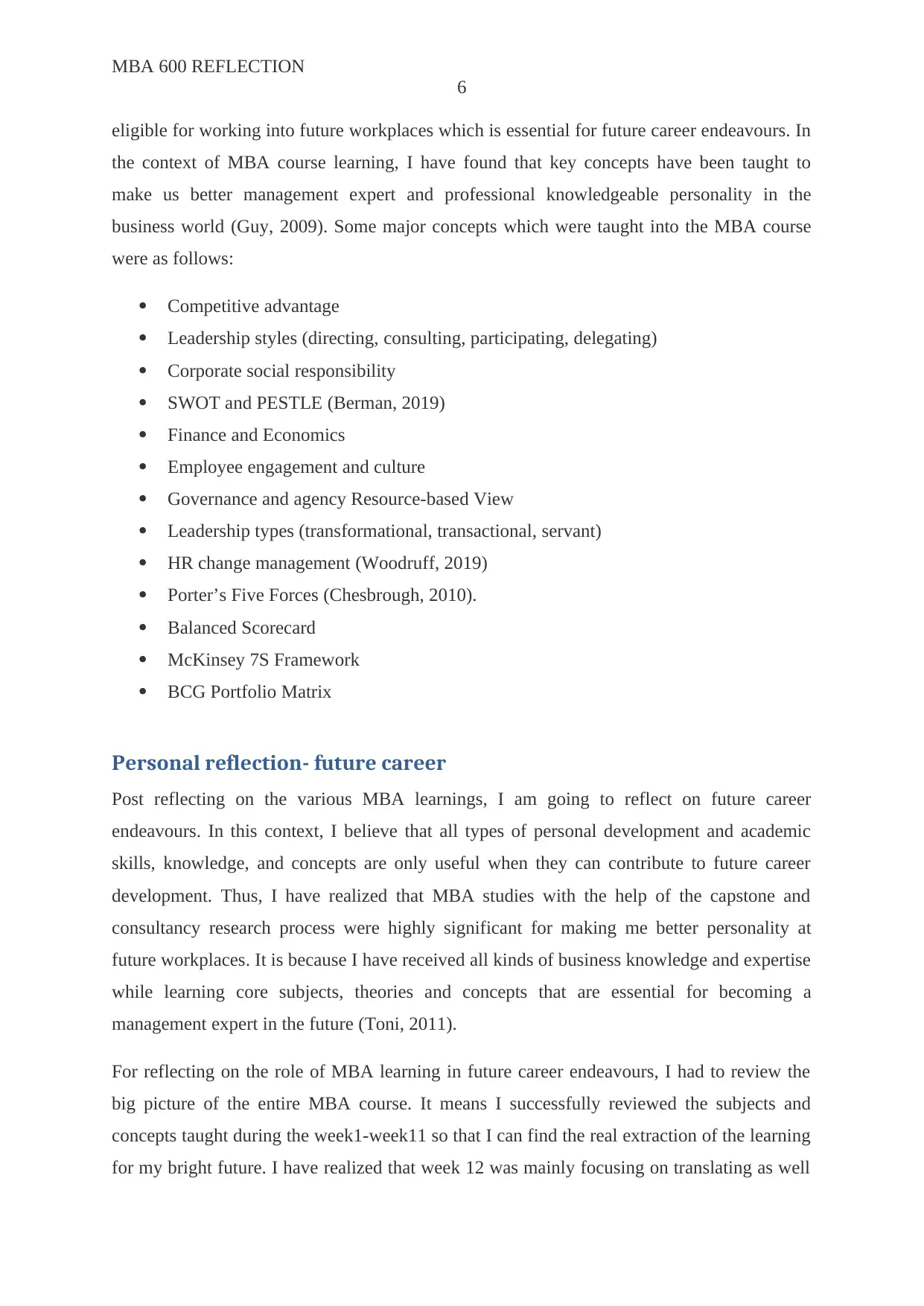
MBA 600 REFLECTION
6
eligible for working into future workplaces which is essential for future career endeavours. In
the context of MBA course learning, I have found that key concepts have been taught to
make us better management expert and professional knowledgeable personality in the
business world (Guy, 2009). Some major concepts which were taught into the MBA course
were as follows:
Competitive advantage
Leadership styles (directing, consulting, participating, delegating)
Corporate social responsibility
SWOT and PESTLE (Berman, 2019)
Finance and Economics
Employee engagement and culture
Governance and agency Resource-based View
Leadership types (transformational, transactional, servant)
HR change management (Woodruff, 2019)
Porter’s Five Forces (Chesbrough, 2010).
Balanced Scorecard
McKinsey 7S Framework
BCG Portfolio Matrix
Personal reflection- future career
Post reflecting on the various MBA learnings, I am going to reflect on future career
endeavours. In this context, I believe that all types of personal development and academic
skills, knowledge, and concepts are only useful when they can contribute to future career
development. Thus, I have realized that MBA studies with the help of the capstone and
consultancy research process were highly significant for making me better personality at
future workplaces. It is because I have received all kinds of business knowledge and expertise
while learning core subjects, theories and concepts that are essential for becoming a
management expert in the future (Toni, 2011).
For reflecting on the role of MBA learning in future career endeavours, I had to review the
big picture of the entire MBA course. It means I successfully reviewed the subjects and
concepts taught during the week1-week11 so that I can find the real extraction of the learning
for my bright future. I have realized that week 12 was mainly focusing on translating as well
6
eligible for working into future workplaces which is essential for future career endeavours. In
the context of MBA course learning, I have found that key concepts have been taught to
make us better management expert and professional knowledgeable personality in the
business world (Guy, 2009). Some major concepts which were taught into the MBA course
were as follows:
Competitive advantage
Leadership styles (directing, consulting, participating, delegating)
Corporate social responsibility
SWOT and PESTLE (Berman, 2019)
Finance and Economics
Employee engagement and culture
Governance and agency Resource-based View
Leadership types (transformational, transactional, servant)
HR change management (Woodruff, 2019)
Porter’s Five Forces (Chesbrough, 2010).
Balanced Scorecard
McKinsey 7S Framework
BCG Portfolio Matrix
Personal reflection- future career
Post reflecting on the various MBA learnings, I am going to reflect on future career
endeavours. In this context, I believe that all types of personal development and academic
skills, knowledge, and concepts are only useful when they can contribute to future career
development. Thus, I have realized that MBA studies with the help of the capstone and
consultancy research process were highly significant for making me better personality at
future workplaces. It is because I have received all kinds of business knowledge and expertise
while learning core subjects, theories and concepts that are essential for becoming a
management expert in the future (Toni, 2011).
For reflecting on the role of MBA learning in future career endeavours, I had to review the
big picture of the entire MBA course. It means I successfully reviewed the subjects and
concepts taught during the week1-week11 so that I can find the real extraction of the learning
for my bright future. I have realized that week 12 was mainly focusing on translating as well
Paraphrase This Document
Need a fresh take? Get an instant paraphrase of this document with our AI Paraphraser
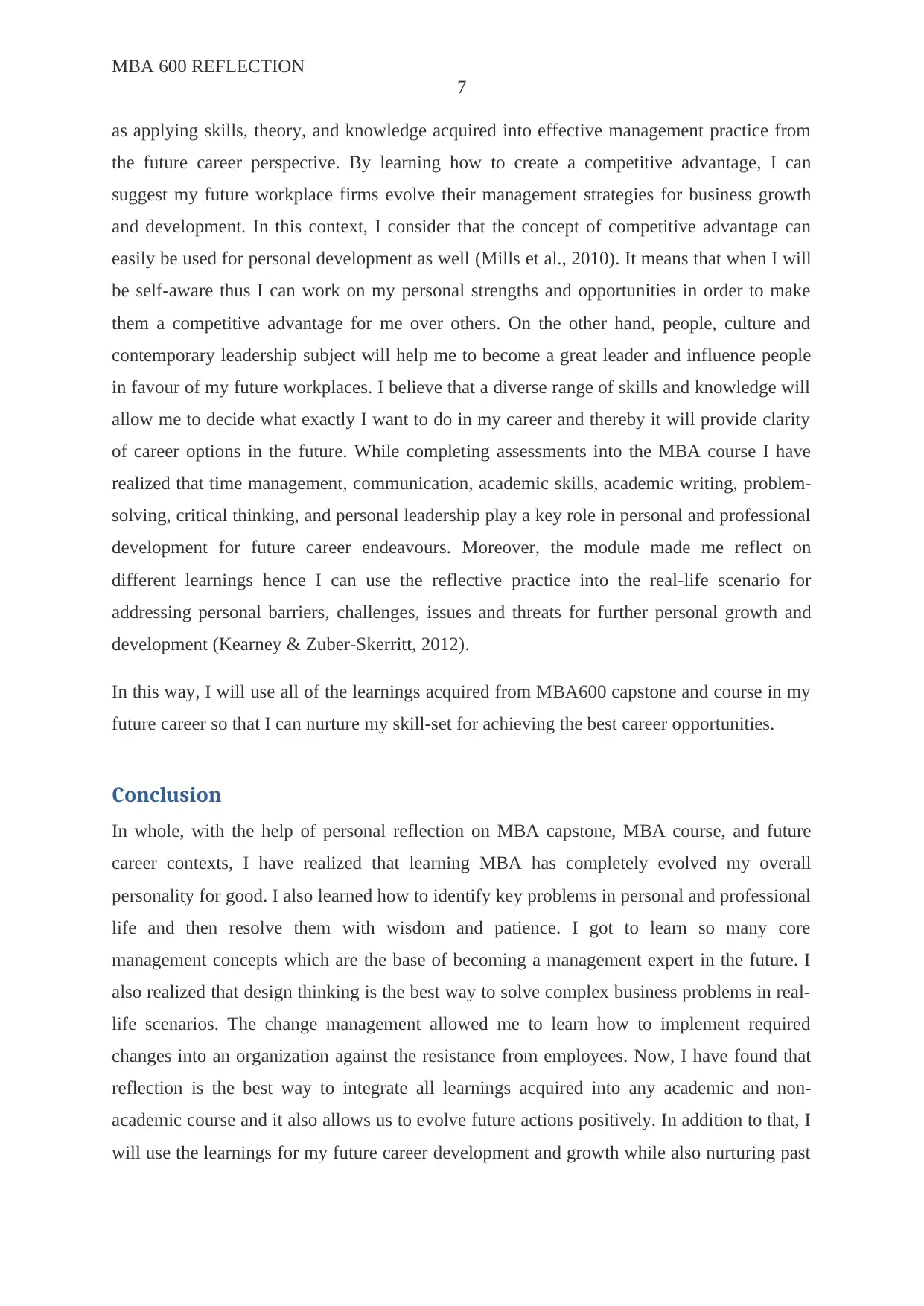
MBA 600 REFLECTION
7
as applying skills, theory, and knowledge acquired into effective management practice from
the future career perspective. By learning how to create a competitive advantage, I can
suggest my future workplace firms evolve their management strategies for business growth
and development. In this context, I consider that the concept of competitive advantage can
easily be used for personal development as well (Mills et al., 2010). It means that when I will
be self-aware thus I can work on my personal strengths and opportunities in order to make
them a competitive advantage for me over others. On the other hand, people, culture and
contemporary leadership subject will help me to become a great leader and influence people
in favour of my future workplaces. I believe that a diverse range of skills and knowledge will
allow me to decide what exactly I want to do in my career and thereby it will provide clarity
of career options in the future. While completing assessments into the MBA course I have
realized that time management, communication, academic skills, academic writing, problem-
solving, critical thinking, and personal leadership play a key role in personal and professional
development for future career endeavours. Moreover, the module made me reflect on
different learnings hence I can use the reflective practice into the real-life scenario for
addressing personal barriers, challenges, issues and threats for further personal growth and
development (Kearney & Zuber-Skerritt, 2012).
In this way, I will use all of the learnings acquired from MBA600 capstone and course in my
future career so that I can nurture my skill-set for achieving the best career opportunities.
Conclusion
In whole, with the help of personal reflection on MBA capstone, MBA course, and future
career contexts, I have realized that learning MBA has completely evolved my overall
personality for good. I also learned how to identify key problems in personal and professional
life and then resolve them with wisdom and patience. I got to learn so many core
management concepts which are the base of becoming a management expert in the future. I
also realized that design thinking is the best way to solve complex business problems in real-
life scenarios. The change management allowed me to learn how to implement required
changes into an organization against the resistance from employees. Now, I have found that
reflection is the best way to integrate all learnings acquired into any academic and non-
academic course and it also allows us to evolve future actions positively. In addition to that, I
will use the learnings for my future career development and growth while also nurturing past
7
as applying skills, theory, and knowledge acquired into effective management practice from
the future career perspective. By learning how to create a competitive advantage, I can
suggest my future workplace firms evolve their management strategies for business growth
and development. In this context, I consider that the concept of competitive advantage can
easily be used for personal development as well (Mills et al., 2010). It means that when I will
be self-aware thus I can work on my personal strengths and opportunities in order to make
them a competitive advantage for me over others. On the other hand, people, culture and
contemporary leadership subject will help me to become a great leader and influence people
in favour of my future workplaces. I believe that a diverse range of skills and knowledge will
allow me to decide what exactly I want to do in my career and thereby it will provide clarity
of career options in the future. While completing assessments into the MBA course I have
realized that time management, communication, academic skills, academic writing, problem-
solving, critical thinking, and personal leadership play a key role in personal and professional
development for future career endeavours. Moreover, the module made me reflect on
different learnings hence I can use the reflective practice into the real-life scenario for
addressing personal barriers, challenges, issues and threats for further personal growth and
development (Kearney & Zuber-Skerritt, 2012).
In this way, I will use all of the learnings acquired from MBA600 capstone and course in my
future career so that I can nurture my skill-set for achieving the best career opportunities.
Conclusion
In whole, with the help of personal reflection on MBA capstone, MBA course, and future
career contexts, I have realized that learning MBA has completely evolved my overall
personality for good. I also learned how to identify key problems in personal and professional
life and then resolve them with wisdom and patience. I got to learn so many core
management concepts which are the base of becoming a management expert in the future. I
also realized that design thinking is the best way to solve complex business problems in real-
life scenarios. The change management allowed me to learn how to implement required
changes into an organization against the resistance from employees. Now, I have found that
reflection is the best way to integrate all learnings acquired into any academic and non-
academic course and it also allows us to evolve future actions positively. In addition to that, I
will use the learnings for my future career development and growth while also nurturing past
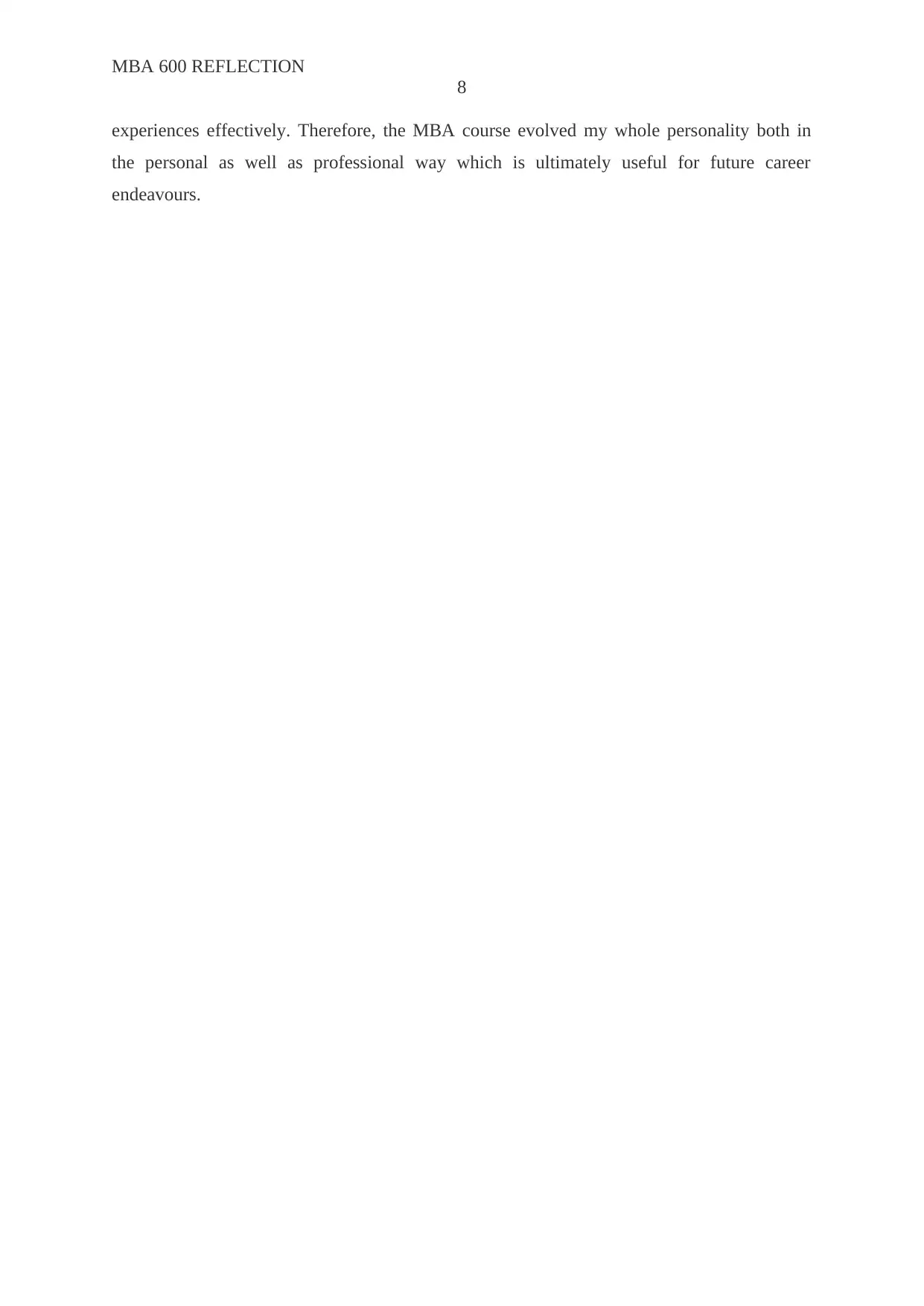
MBA 600 REFLECTION
8
experiences effectively. Therefore, the MBA course evolved my whole personality both in
the personal as well as professional way which is ultimately useful for future career
endeavours.
8
experiences effectively. Therefore, the MBA course evolved my whole personality both in
the personal as well as professional way which is ultimately useful for future career
endeavours.
⊘ This is a preview!⊘
Do you want full access?
Subscribe today to unlock all pages.

Trusted by 1+ million students worldwide
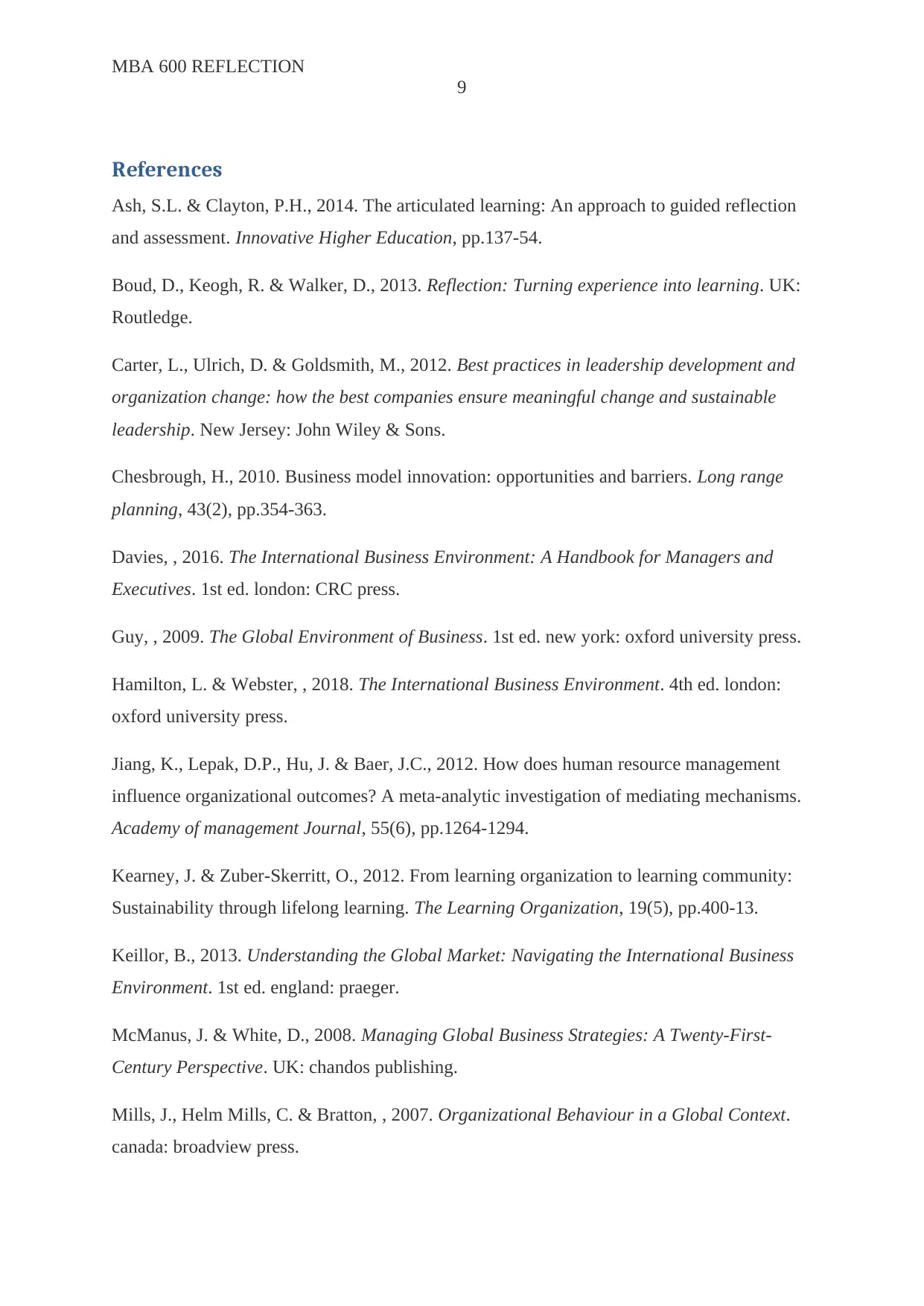
MBA 600 REFLECTION
9
References
Ash, S.L. & Clayton, P.H., 2014. The articulated learning: An approach to guided reflection
and assessment. Innovative Higher Education, pp.137-54.
Boud, D., Keogh, R. & Walker, D., 2013. Reflection: Turning experience into learning. UK:
Routledge.
Carter, L., Ulrich, D. & Goldsmith, M., 2012. Best practices in leadership development and
organization change: how the best companies ensure meaningful change and sustainable
leadership. New Jersey: John Wiley & Sons.
Chesbrough, H., 2010. Business model innovation: opportunities and barriers. Long range
planning, 43(2), pp.354-363.
Davies, , 2016. The International Business Environment: A Handbook for Managers and
Executives. 1st ed. london: CRC press.
Guy, , 2009. The Global Environment of Business. 1st ed. new york: oxford university press.
Hamilton, L. & Webster, , 2018. The International Business Environment. 4th ed. london:
oxford university press.
Jiang, K., Lepak, D.P., Hu, J. & Baer, J.C., 2012. How does human resource management
influence organizational outcomes? A meta-analytic investigation of mediating mechanisms.
Academy of management Journal, 55(6), pp.1264-1294.
Kearney, J. & Zuber-Skerritt, O., 2012. From learning organization to learning community:
Sustainability through lifelong learning. The Learning Organization, 19(5), pp.400-13.
Keillor, B., 2013. Understanding the Global Market: Navigating the International Business
Environment. 1st ed. england: praeger.
McManus, J. & White, D., 2008. Managing Global Business Strategies: A Twenty-First-
Century Perspective. UK: chandos publishing.
Mills, J., Helm Mills, C. & Bratton, , 2007. Organizational Behaviour in a Global Context.
canada: broadview press.
9
References
Ash, S.L. & Clayton, P.H., 2014. The articulated learning: An approach to guided reflection
and assessment. Innovative Higher Education, pp.137-54.
Boud, D., Keogh, R. & Walker, D., 2013. Reflection: Turning experience into learning. UK:
Routledge.
Carter, L., Ulrich, D. & Goldsmith, M., 2012. Best practices in leadership development and
organization change: how the best companies ensure meaningful change and sustainable
leadership. New Jersey: John Wiley & Sons.
Chesbrough, H., 2010. Business model innovation: opportunities and barriers. Long range
planning, 43(2), pp.354-363.
Davies, , 2016. The International Business Environment: A Handbook for Managers and
Executives. 1st ed. london: CRC press.
Guy, , 2009. The Global Environment of Business. 1st ed. new york: oxford university press.
Hamilton, L. & Webster, , 2018. The International Business Environment. 4th ed. london:
oxford university press.
Jiang, K., Lepak, D.P., Hu, J. & Baer, J.C., 2012. How does human resource management
influence organizational outcomes? A meta-analytic investigation of mediating mechanisms.
Academy of management Journal, 55(6), pp.1264-1294.
Kearney, J. & Zuber-Skerritt, O., 2012. From learning organization to learning community:
Sustainability through lifelong learning. The Learning Organization, 19(5), pp.400-13.
Keillor, B., 2013. Understanding the Global Market: Navigating the International Business
Environment. 1st ed. england: praeger.
McManus, J. & White, D., 2008. Managing Global Business Strategies: A Twenty-First-
Century Perspective. UK: chandos publishing.
Mills, J., Helm Mills, C. & Bratton, , 2007. Organizational Behaviour in a Global Context.
canada: broadview press.
Paraphrase This Document
Need a fresh take? Get an instant paraphrase of this document with our AI Paraphraser
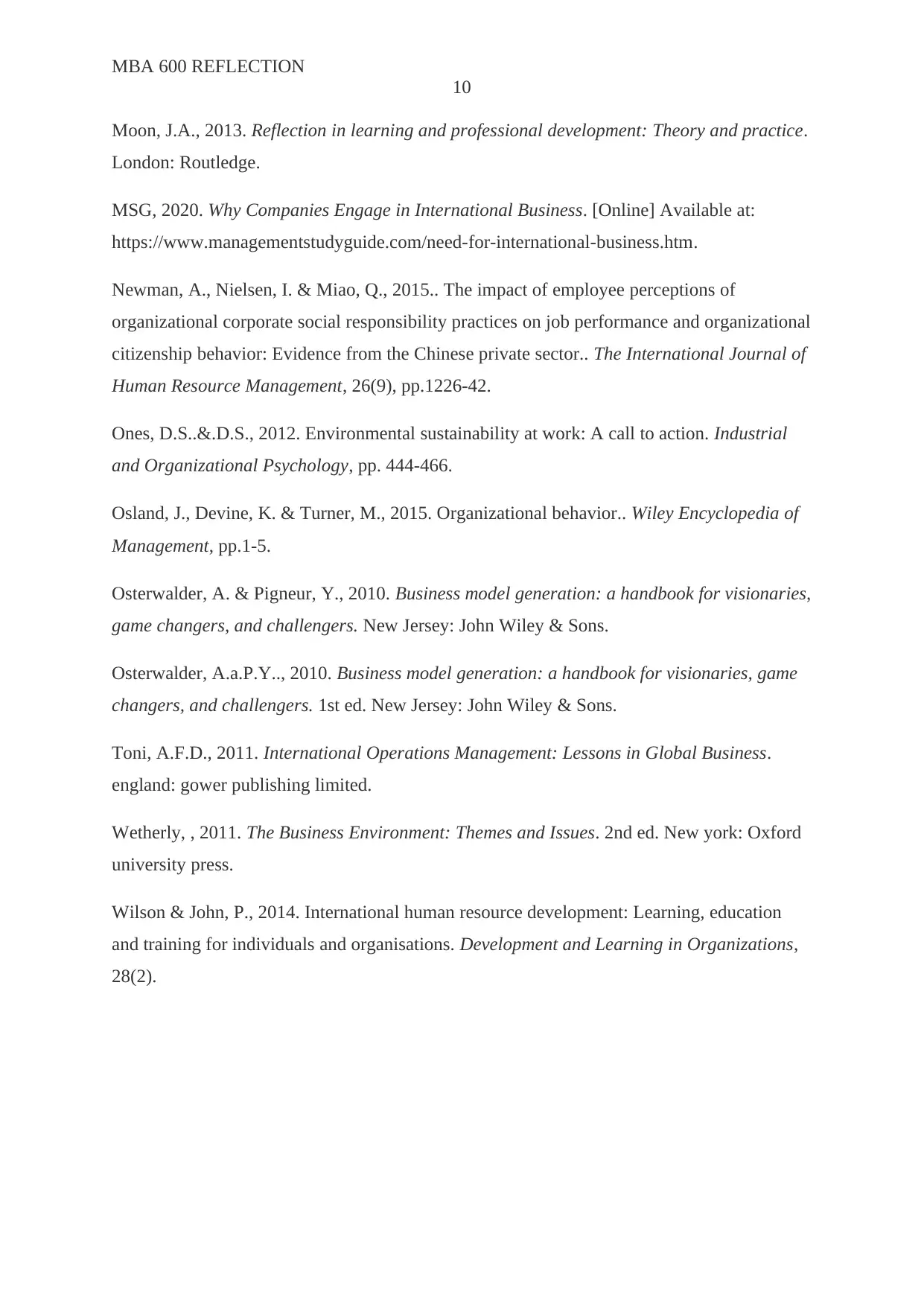
MBA 600 REFLECTION
10
Moon, J.A., 2013. Reflection in learning and professional development: Theory and practice.
London: Routledge.
MSG, 2020. Why Companies Engage in International Business. [Online] Available at:
https://www.managementstudyguide.com/need-for-international-business.htm.
Newman, A., Nielsen, I. & Miao, Q., 2015.. The impact of employee perceptions of
organizational corporate social responsibility practices on job performance and organizational
citizenship behavior: Evidence from the Chinese private sector.. The International Journal of
Human Resource Management, 26(9), pp.1226-42.
Ones, D.S..&.D.S., 2012. Environmental sustainability at work: A call to action. Industrial
and Organizational Psychology, pp. 444-466.
Osland, J., Devine, K. & Turner, M., 2015. Organizational behavior.. Wiley Encyclopedia of
Management, pp.1-5.
Osterwalder, A. & Pigneur, Y., 2010. Business model generation: a handbook for visionaries,
game changers, and challengers. New Jersey: John Wiley & Sons.
Osterwalder, A.a.P.Y.., 2010. Business model generation: a handbook for visionaries, game
changers, and challengers. 1st ed. New Jersey: John Wiley & Sons.
Toni, A.F.D., 2011. International Operations Management: Lessons in Global Business.
england: gower publishing limited.
Wetherly, , 2011. The Business Environment: Themes and Issues. 2nd ed. New york: Oxford
university press.
Wilson & John, P., 2014. International human resource development: Learning, education
and training for individuals and organisations. Development and Learning in Organizations,
28(2).
10
Moon, J.A., 2013. Reflection in learning and professional development: Theory and practice.
London: Routledge.
MSG, 2020. Why Companies Engage in International Business. [Online] Available at:
https://www.managementstudyguide.com/need-for-international-business.htm.
Newman, A., Nielsen, I. & Miao, Q., 2015.. The impact of employee perceptions of
organizational corporate social responsibility practices on job performance and organizational
citizenship behavior: Evidence from the Chinese private sector.. The International Journal of
Human Resource Management, 26(9), pp.1226-42.
Ones, D.S..&.D.S., 2012. Environmental sustainability at work: A call to action. Industrial
and Organizational Psychology, pp. 444-466.
Osland, J., Devine, K. & Turner, M., 2015. Organizational behavior.. Wiley Encyclopedia of
Management, pp.1-5.
Osterwalder, A. & Pigneur, Y., 2010. Business model generation: a handbook for visionaries,
game changers, and challengers. New Jersey: John Wiley & Sons.
Osterwalder, A.a.P.Y.., 2010. Business model generation: a handbook for visionaries, game
changers, and challengers. 1st ed. New Jersey: John Wiley & Sons.
Toni, A.F.D., 2011. International Operations Management: Lessons in Global Business.
england: gower publishing limited.
Wetherly, , 2011. The Business Environment: Themes and Issues. 2nd ed. New york: Oxford
university press.
Wilson & John, P., 2014. International human resource development: Learning, education
and training for individuals and organisations. Development and Learning in Organizations,
28(2).
1 out of 11
Related Documents
Your All-in-One AI-Powered Toolkit for Academic Success.
+13062052269
info@desklib.com
Available 24*7 on WhatsApp / Email
![[object Object]](/_next/static/media/star-bottom.7253800d.svg)
Unlock your academic potential
Copyright © 2020–2026 A2Z Services. All Rights Reserved. Developed and managed by ZUCOL.



